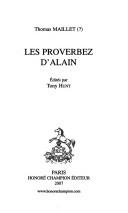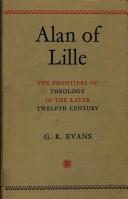| Listing 1 - 10 of 28 | << page >> |
Sort by
|
Book
Year: 1932 Volume: 6 Publisher: Amsterdam : Noord-Hollandsche uitgevers-maatschappij,
Abstract | Keywords | Export | Availability | Bookmark
 Loading...
Loading...Choose an application
- Reference Manager
- EndNote
- RefWorks (Direct export to RefWorks)
Book
Year: 1951 Volume: 12 Publisher: Paris : J. Vrin,
Abstract | Keywords | Export | Availability | Bookmark
 Loading...
Loading...Choose an application
- Reference Manager
- EndNote
- RefWorks (Direct export to RefWorks)
Dissertation
Year: 1944 Publisher: Washington : Catholic University of America Press,
Abstract | Keywords | Export | Availability | Bookmark
 Loading...
Loading...Choose an application
- Reference Manager
- EndNote
- RefWorks (Direct export to RefWorks)
Book
ISBN: 019009138X 9780190091385 Year: 2021 Publisher: New York Oxford University Press
Abstract | Keywords | Export | Availability | Bookmark
 Loading...
Loading...Choose an application
- Reference Manager
- EndNote
- RefWorks (Direct export to RefWorks)
This text considers how ancient and medieval commentaries on the Aeneid by Servius, Fulgentius, Bernard Silvestris, and others can give us new insights into four twelfth-century Latin epics - the Ylias by Joseph of Exeter, the Alexandreis by Walter of Chtillon, the Anticlaudianus by Alan of Lille, and the Architrenius by John of Hauville. Virgil's influence on twelfth-century Latin epic is generally thought to be limited to verbal echoes and occasional narrative episodes, but evidence is presented that more global influences have been overlooked because ancient and medieval interpretations of the Aeneid, as preserved by the commentaries, were often radically different from modern readings of the Aeneid. By explaining how to interpret the Aeneid, these commentaries directly influenced the way in which twelfth-century Latin epic imitated the Aeneid.
Book
ISBN: 2503520154 9782503520155 Year: 2005 Volume: 12 Publisher: Turnhout Brepols
Abstract | Keywords | Export | Availability | Bookmark
 Loading...
Loading...Choose an application
- Reference Manager
- EndNote
- RefWorks (Direct export to RefWorks)
Né aux alentours de 1120, surnommé le " Docteur universel ", Alain de Lille doit ce titre à ses talents de philosophe, de théologien, de prédicateur et de poète, ainsi qu'à l'étendue de ses connaissances. Celui dont l'épitaphe dit qu' "il a su tout ce que l'homme pouvait savoir" est à lui seul un résumé des intérêts multiples de son temps. Sa pensée est le point de rencontre des grands courants philosophico-théologiques du XIIe siècle ; au fait des dernières avancées techniques dans les arts libéraux, il demeure en même temps un parfait témoin de l'humanisme littéraire. A l'occasion du huitième centenaire de sa mort, il était nécessaire de réexplorer la synthèse qu'a opérée Alain des savoirs de cette époque charnière, et de rappeler les pistes et les problématiques qu'il a ouvertes, peu avant le grand essor universitaire du XIIIe siècle.
Alan of Lille --- Philosophy, Medieval --- Alanus, de Insulis, --- Philosophie médiévale --- Alain de Lille --- Alanus van Rijsel --- Colloques --- Colloquia --- Filosofie van de Middeleeuwen --- Philosophie du Moyen Age --- Philosophie médiévale --- Congresses --- Congrès --- Alanus, --- Alain, --- Alan, --- Alanus de Insulis, --- Alano, --- Insulis, Alanus de, --- Isle, Alain de l', --- L'Isle, Alain de, --- Ryssel, Alain von, --- Montepessulano, Alanus de, --- Alanus, de Insulis, - d. 1202.

ISBN: 9782745314598 2745314599 Year: 2007 Volume: 151 Publisher: Paris Champion
Abstract | Keywords | Export | Availability | Bookmark
 Loading...
Loading...Choose an application
- Reference Manager
- EndNote
- RefWorks (Direct export to RefWorks)
Il y a trois traductions en ancien français du Liber parabolarum d'Alain de Lille, dont la présente, jusqu'ici inédite, date de la fin du XIVe siècle et a toutes les probabilités d'être l'œuvre de Thomas Maillet, traducteur, dont on ne connaît d'ailleurs rien, de deux Facetus latins. Ce texte transmet la sagesse proverbiale, non sans des allusions mythologiques, et té moigne de la survivance des textes scolaires qui apparurent dans des manuels latins dits 'libri Catoniani' au XIIe siècle et qui sont restés en usage jusqu'à la Renaissance.
Old French literature --- Alanus, --- Proverbs --- Alain, --- Alan, --- Alanus de Insulis, --- Alano, --- Insulis, Alanus de, --- Isle, Alain de l', --- L'Isle, Alain de, --- Ryssel, Alain von, --- Montepessulano, Alanus de, --- Translations into French --- History and criticism. --- Proverbs - Poetry
Book
ISBN: 9783451287091 Year: 2009 Publisher: Freiburg Herder
Abstract | Keywords | Export | Availability | Bookmark
 Loading...
Loading...Choose an application
- Reference Manager
- EndNote
- RefWorks (Direct export to RefWorks)

ISBN: 0521246180 0521094267 0511555229 051186776X 9780521246187 9780511555220 9780521094269 Year: 1983 Publisher: Cambridge University Press
Abstract | Keywords | Export | Availability | Bookmark
 Loading...
Loading...Choose an application
- Reference Manager
- EndNote
- RefWorks (Direct export to RefWorks)
Alan of Lille was a notable figure in the second half of the twelfth century as a theologian and as a poet and he has seemed as rich and individual a writer to modern scholars as he did to his own contemporaries. This study examines his work as a whole, in an attempt to set his well-known literary achievement in the context of his theological writings. He was in many ways a pioneer, an experimenter with several of the new genres of his day, an innovator both as a teacher and as an author. He was not an original thinker so much as an eclectic, drawing on a wide range of the sources available to his contemporaries. He shows us what might be done by a lively-minded scholar with the resources of the day, within the schools of late twelfth-century France, to bring theology alive and make it interesting and challenging to his readers.
Christian theology --- Alan of Lille --- Theology --- Philosophers --- Theologians --- History --- Alanus, --- 2 ALANUS DE INSULIS --- -Christian theology --- Theology, Christian --- Christianity --- Religion --- Godsdienst. Theologie--ALANUS DE INSULIS --- -Theology --- -Godsdienst. Theologie--ALANUS DE INSULIS --- -2 ALANUS DE INSULIS --- 2 ALANUS DE INSULIS Godsdienst. Theologie--ALANUS DE INSULIS --- Arts and Humanities --- Theology - History - Middle Ages, 600-1500 --- Philosophers - France - Biography --- Theologians - France - Biography --- Alanus, - de Insulis, - -1202 --- Alain, --- Alan, --- Alanus de Insulis, --- Alano, --- Insulis, Alanus de, --- Isle, Alain de l', --- L'Isle, Alain de, --- Ryssel, Alain von, --- Montepessulano, Alanus de,
Book
ISBN: 9782503538495 9782503520155 2503520154 Year: 2005 Publisher: Turnhout Brepols
Abstract | Keywords | Export | Availability | Bookmark
 Loading...
Loading...Choose an application
- Reference Manager
- EndNote
- RefWorks (Direct export to RefWorks)
Né aux alentours de 1120, surnommé le «Docteur universel», Alain de Lille doit ce titre à ses talents de philosophe, de théologien, de prédicateur et de poète, ainsi qu’à l’étendue de ses connaissances. Celui dont l’épitaphe dit qu’«il a su tout ce que l’homme pouvait savoir» est à lui seul un résumé des intérêts multiples de son temps. Sa pensée est le point de rencontre des grands courants philosophico-théologiques du XIIe siècle; au fait des dernières avancées techniques dans les arts libéraux, il demeure en même temps un parfait témoin de l’humanisme littéraire. A l’occasion du huitième centenaire de sa mort, il était nécessaire de réexplorer la synthèse qu’a opérée Alain des savoirs de cette époque charnière, et de rappeler les pistes et les problématiques qu’il a ouvertes, peu avant le grand essor universitaire du XIIIe siècle.
Philosophy, Medieval --- Philosophie médiévale --- Alanus, --- Alain, --- Mediaeval philosophy --- 12th century --- Criticism --- Alanus, de Insulis, - d. 1202.
Book
ISBN: 9004290141 9789004290143 9789004272187 9004272186 Year: 2015 Publisher: Leiden Boston
Abstract | Keywords | Export | Availability | Bookmark
 Loading...
Loading...Choose an application
- Reference Manager
- EndNote
- RefWorks (Direct export to RefWorks)
A Companion to Alain Chartier: Father of French Eloquence brings together fourteen contributions that offer a range of perspectives and insights into the works of this exceptional late medieval author. As heir to the past and herald of the future, Chartier reinvented the traditional, whether in Latin or French, verse or prose. Chartier’s open-ended, dialogic works and his own politically-engaged writing inspired his successors to think and write in new ways about ethics, the individual’s role in society, relationships between men and women, and the responsibility of a poet to his/her audience. As these essays show, Chartier’s renovation of poetic form and content had considerable influence over successive generations of writers in France and across Europe. Contributors are: Adrian Armstrong, Florence Bouchet, Emma Cayley, Daisy Delogu, Ashby Kinch, James C. Laidlaw, Marta Marfany, Deborah McGrady, Joan E. McRae, Jean-Claude Mühlethaler, Liv Robinson, Camille Serchuk, Andrea Tarnowski, Craig Taylor, and Hanno Wijsman.
French literature --- Literature, Medieval --- Eloquence in literature. --- History and criticism. --- Chartier, Alain, --- Alain Chartier --- Auriga, Alanus, --- Aurigarius, Alanus, --- Charretier, Alain, --- Criticism and interpretation.
| Listing 1 - 10 of 28 | << page >> |
Sort by
|

 Search
Search Feedback
Feedback About UniCat
About UniCat  Help
Help News
News